How to Choose the Best Mortuary Science Degree Colleges: Fast Facts & Essential Checklist
Mortuary science degree colleges prepare students for rewarding careers as funeral directors, embalmers, and more. If you want a quick answer, here are the essential points:
| Step | What to Look For |
|---|---|
| 1. | ABFSE Accreditation (required for licensure in most states) |
| 2. | Strong National Board Exam Pass Rates (higher rates = better prep) |
| 3. | Program Format (on-campus, online, or hybrid; check clinical requirements) |
| 4. | Tuition and Aid (compare total cost, scholarships, FAFSA eligibility) |
| 5. | Internships & Job Placement (ask about hands-on labs, networking, employment rate) |
Over 80 accredited mortuary science degree colleges in the U.S. offer options from 18-month associate programs to four-year bachelor's degrees. Most require a mix of classroom learning and hands-on clinical work. Programs with high graduation and job placement rates tend to yield the best return on your investment.
Fun fact: In 2021, mortuary schools saw a 24% spike in enrollment—proof that demand for skilled professionals is growing.
I'm Mortuary Cooler, a national mortuary cooler supplier with extensive experience helping funeral homes steer equipment and education choices. My deep knowledge of mortuary science degree colleges comes from working side-by-side with directors and students across the U.S.—let's break down everything you need to make a smart college decision.
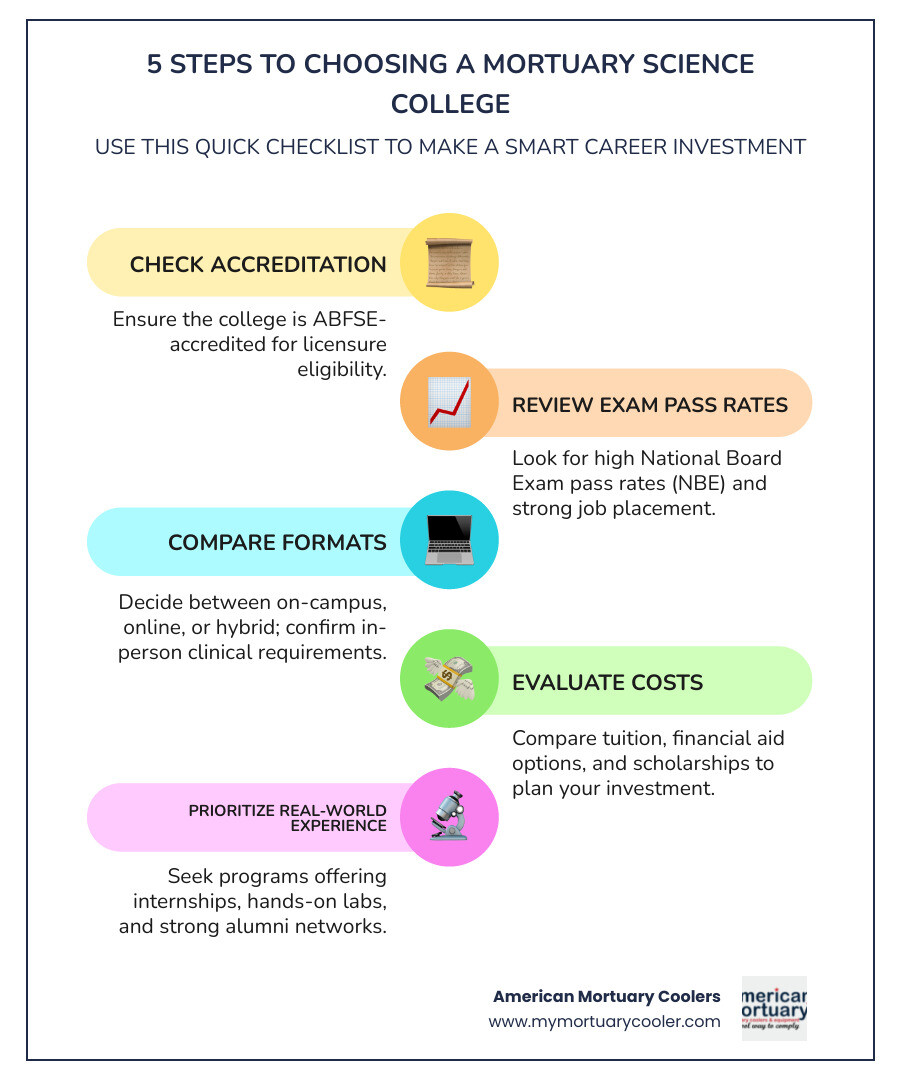
Find more about mortuary science degree colleges:
Trick #1: Verify ABFSE Accreditation & National Board Pass Rates at mortuary science degree colleges
Let me share the most important advice I give every student looking at mortuary science degree colleges: never, ever enroll without ABFSE accreditation. I've seen too many heartbroken students complete entire programs only to find they can't get licensed in their state.
The American Board of Funeral Service Education (ABFSE) sets the gold standard for funeral service education. Right now, only 58 funeral service programs across the entire United States hold this crucial accreditation. It's not just a nice-to-have certificate—it's your ticket to taking the National Board Examination (NBE), which most states require for licensure.
Without ABFSE accreditation, your degree might as well be printed on fancy paper.
The real magic happens when you look at the numbers from top-performing schools. Arapahoe Community College boasts a 65% NBE pass rate—that's 8 points higher than the national average. Cincinnati College of Mortuary Science maintains nearly a 90% graduation rate with over 85% of graduates finding employment. Mid-America College of Funeral Service achieved an impressive 92% employment rate for their 2021 graduates.
These aren't just statistics—they represent real people launching successful careers. Scientific research on rising enrollment shows the field is booming. Dallas Institute of Funeral Service saw enrollment jump 109% from 2019 to 2021, while Mid-America College experienced a 94% increase during the same period.
What NBE Scores Reveal About mortuary science degree colleges
National Board Examination scores are like a crystal ball for your future success. After working with countless funeral homes, I've noticed that schools with higher NBE pass rates consistently offer smaller class sizes, better faculty-to-student ratios, more comprehensive lab facilities, and stronger industry connections.
When you visit potential schools, don't be shy about asking for specific NBE pass rates for both the Arts and Sciences portions. Schools that perform above the national average aren't just lucky—they're doing something right.
The employment numbers tell an equally compelling story. Over 80% of Arapahoe Community College graduates land jobs in funeral services. Cincinnati College maintains that stellar 85% employment rate year after year. These numbers reflect more than just academic quality—they show schools that actively support their students' career transitions.
The bottom line? High NBE scores and employment rates signal a program that will prepare you for real-world success, not just graduation day.
More info about Mortuary Science Courses can help you understand what to expect from a quality curriculum.
Trick #2: Compare Program Formats—On-Campus, Online & Hybrid
When I started working with funeral homes across the country, I noticed something interesting: the best-prepared new graduates almost always came from programs that matched their learning style and life situation. Today's mortuary science degree colleges offer three main formats, and choosing the right one can make or break your educational experience.
The numbers are impressive—43 ABFSE-accredited programs now offer some form of distance education, with many allowing more than half of your coursework to be completed online. But here's what I've learned from talking to hundreds of students and graduates: convenience isn't everything.
On-campus programs still reign supreme when it comes to hands-on learning. There's something irreplaceable about having immediate access to embalming labs, getting real-time feedback from your instructor during a restoration procedure, or troubleshooting equipment issues with classmates right there beside you.
Online programs offer incredible flexibility, especially if you're working full-time or have family obligations. But don't let anyone tell you they're "easier." Even fully online programs require significant hands-on work. Take Arapahoe Community College's online program—it's fully accredited and well-respected, but students still need to complete a mandatory 3-day on-campus embalming lab.
Hybrid programs try to give you the best of both worlds, though the quality varies dramatically between schools. Some offer sophisticated virtual learning platforms with regular intensive weekends, while others just move their lectures online and call it "hybrid."
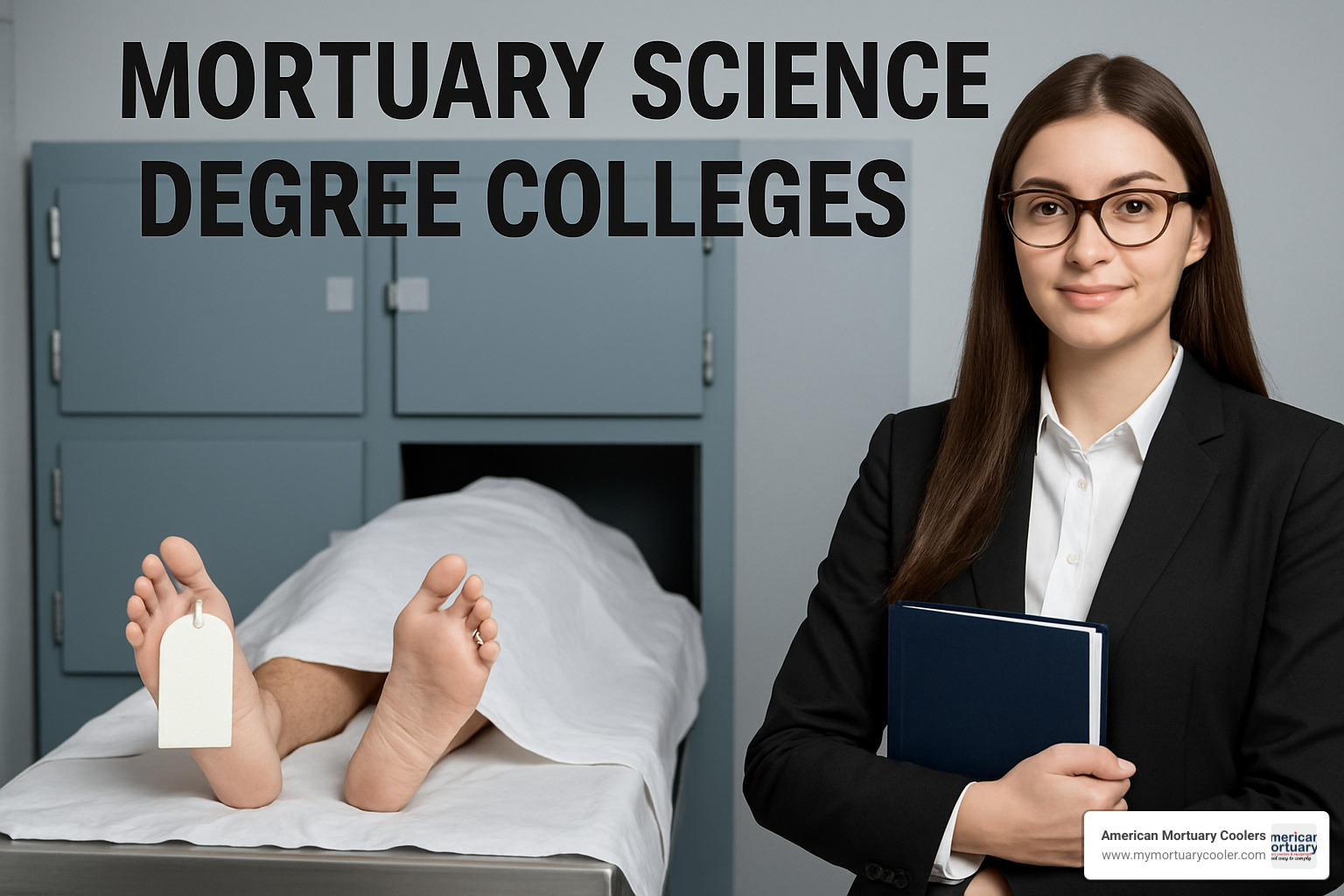
Before you get excited about any distance education program, there's a crucial step many students skip: verifying state authorization. Scientific research on distance education readiness shows that state requirements vary significantly. Credits from unauthorized programs might not count toward your licensure—imagine finding that after two years of study.
Hidden Costs of Online mortuary science degree colleges
Here's where I see students get blindsided: online programs often advertise lower tuition, but the hidden costs can be brutal. I've watched students budget for a $15,000 program only to spend an extra $5,000 they didn't expect.
Travel expenses hit hardest. Those mandatory lab sessions might require multiple trips to campus throughout your program. If you live across the country, you're looking at airfare, hotels, meals, and rental cars for each visit.
Technology fees are another surprise. Some schools charge extra for access to virtual embalming simulations or specialized case management software.
Extended residency requirements can also catch you off guard. Some programs require week-long intensives that mean taking time off work and paying for extended hotel stays.
The reality is that mortuary science degree colleges with online options aren't necessarily cheaper—they're just structured differently. Smart students factor in all costs before making their decision.
More info about End-to-End Steps walks you through the complete licensing process, including how your education choice affects your path to becoming licensed.
Trick #3: Scrutinize Tuition, Aid & Return on Investment
Let's talk money—because choosing the right mortuary science degree colleges isn't just about getting a quality education, it's about making a smart financial investment in your future.
The cost landscape for mortuary science programs can feel overwhelming at first glance. We've seen tuition ranges that might surprise you: some accelerated programs start around $12,477, while comprehensive four-year degrees can climb over $25,000. But here's what I've learned from working with countless students and funeral homes—the sticker price never tells the whole story.
Take Carl Sandburg College, for example. Their traditional AAS program runs about $16,656 total, but their accelerated version costs only $12,477. That's a $4,000 difference for essentially the same education, just delivered faster. American Academy McAllister Institute requires 69 credits for graduation, while Commonwealth Institute offers both Associate and Certificate options to fit different career goals.
The good news? Your investment pays off. The Bureau of Labor Statistics projects 9% job growth in funeral services by 2031—that's faster than most careers. With a median salary of $52,000 per year for new graduates, and experienced professionals earning significantly more, the math works in your favor.
Don't let financial concerns scare you away from quality programs. Most accredited mortuary science degree colleges participate in federal financial aid programs, which means you're eligible for Federal Pell Grants, Federal Direct Loans, work-study programs, and state-specific grants and scholarships. Fill out that FAFSA—you might be surprised how much aid you qualify for.
Financing Hacks for mortuary science degree colleges
Over the years, we've finded some clever financing strategies that many students never hear about. These can slash your education costs significantly.
State workforce development grants are hidden gems. Many states offer special funding for high-demand careers like funeral service—check with your state's workforce development agency. You might find programs specifically designed to train people for essential community services.
Employer sponsorship is more common than you'd think. Some funeral homes will pay for your entire education in exchange for a work commitment. It's a win-win: they get a trained employee, and you get free education plus a guaranteed job.
Professional association scholarships from organizations like the National Funeral Directors Association and state funeral directors associations specifically target mortuary science students. These are often less competitive than general college scholarships because fewer people know about them.
Military benefits can be game-changers for veterans. The GI Bill covers tuition at ABFSE-accredited programs and provides monthly housing allowances. The Workforce Innovation and Opportunity Act (WIOA) also provides funding for eligible students pursuing high-demand careers like funeral service.
Cheat Sheet to Salaries breaks down exactly what you can expect to earn in different funeral service roles, helping you calculate your return on investment with real numbers.
Trick #4: Demand Hands-On Experience & Networking Opportunities
When you're choosing between mortuary science degree colleges, the classroom learning is just the beginning. The real magic happens when you get your hands dirty in the embalming lab and start building relationships that will shape your entire career.
The best programs understand that technical skills and people skills can only be developed through real-world practice.
Embalming labs are where theory meets reality. Cincinnati College of Mortuary Science sets the bar high here—their students work in specialized labs with actual case studies, not just textbook examples. They've even got an Educational Cremation Center that gets regular updates, so students graduate understanding every aspect of modern funeral service.
But it's not just about the technical stuff. Quality programs also offer restorative art workshops using cutting-edge techniques, funeral arrangement simulations where students practice with role-playing grieving families, and business management practicums that cover the nuts and bolts of running a funeral home.
The networking piece is absolutely crucial, and the numbers prove it. Mid-America College of Funeral Service hit a 92% employment rate in 2021. That kind of success doesn't happen by accident—it comes from building strong relationships with funeral home partners who actively recruit their graduates.
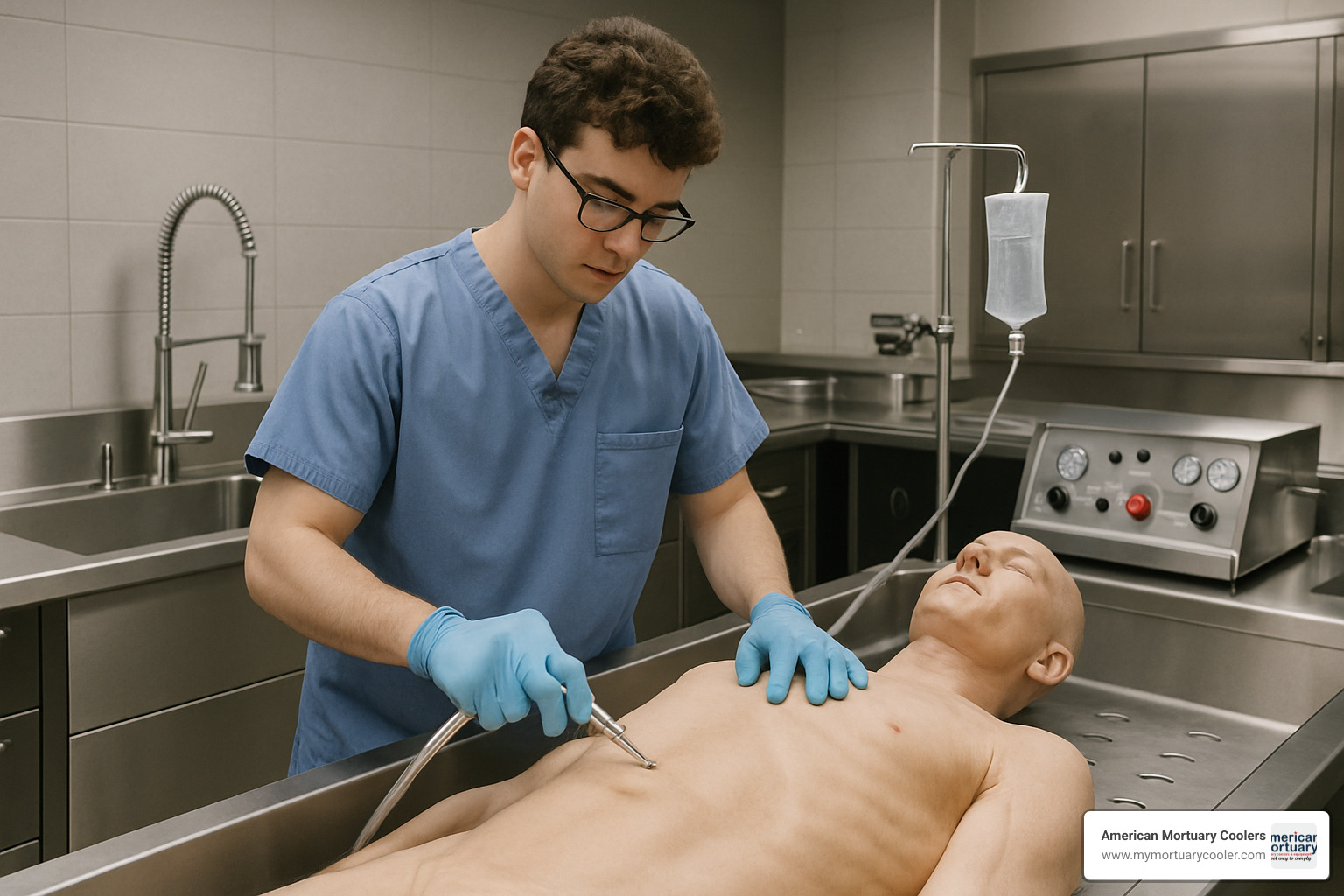
Smart programs create multiple pathways for students to connect with industry professionals. Look for internship placements at established funeral homes, co-op programs that blend work and study, and alumni mentorship programs that pair you with experienced professionals. The best schools also bring in industry guest speakers regularly and help students attend professional conferences where the real networking happens.
Pittsburgh Institute of Mortuary Science demonstrates what comprehensive hands-on training looks like. With their small class sizes, students typically work on hundreds of embalmings per year. That level of practical experience translates directly into career readiness and higher starting salaries.
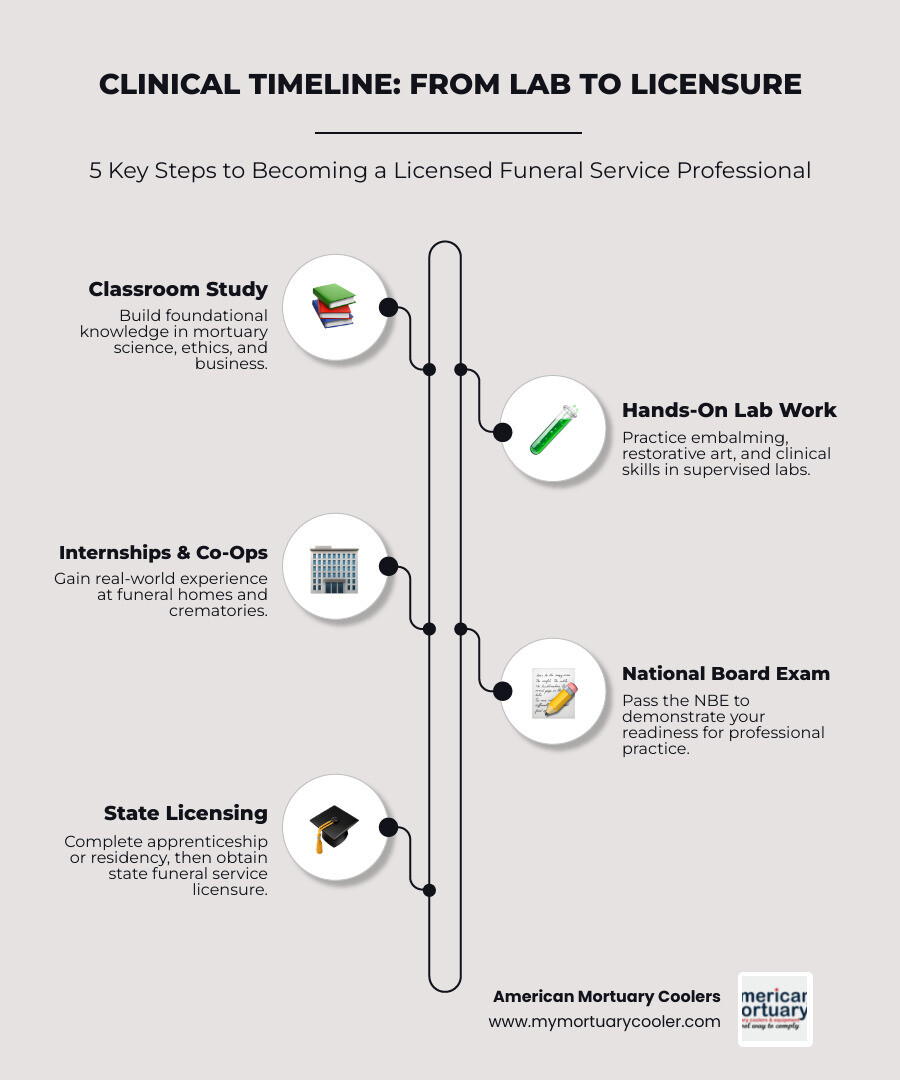
Questions to Ask Campus Tour Guides at mortuary science degree colleges
Campus visits are your chance to dig deeper and separate the truly excellent programs from the merely adequate ones. Here's what we recommend asking to get the real story about hands-on learning opportunities.
Start with the faculty-to-student ratio in lab settings. This matters more than overall class size because lab work requires individual attention during those critical learning moments.
Ask about actual case numbers. How many real cases do students work on during their program? Programs offering 20 or more cases provide significantly better preparation than those with fewer opportunities.
The job placement rate question is crucial, but dig deeper. How do they track employment outcomes? For how long? Legitimate programs follow their graduates for at least two years and can give you detailed statistics.
Find out which professional organizations the school maintains active memberships with. This shows they're plugged into current industry practices and trends.
Don't be shy about asking to connect with recent graduates. Programs that are confident in their outcomes will readily provide references. If they hesitate or make excuses, that's a red flag.
Finally, ask about continuing education opportunities. The funeral industry evolves constantly, and good programs support lifelong learning even after graduation.
The Ins and Outs of a Day in the Life of a Mortician gives you a realistic picture of what daily work actually looks like. Use this insight to evaluate whether the programs you're considering truly prepare students for real-world responsibilities.
Trick #5: Confirm State Licensing Match & Future-Proof Skills
Here's something that catches many students off guard: completing your mortuary science program doesn't automatically qualify you to work anywhere in the country. Each state sets its own licensing rules, and what gets you licensed in Tennessee might not work in California or New York.
We've seen too many graduates find this the hard way. One student completed a program in Ohio, then moved to Florida for a job opportunity—only to find out she needed additional coursework to meet Florida's specific requirements. That's an expensive mistake that could have been avoided with some upfront research.
State licensing requirements vary in several key areas. Some states require specific coursework that others don't. Apprenticeship periods range from 6 months to 2 years depending on where you plan to practice. Many states also have their own board exams beyond the National Board Examination.
Before you enroll in any mortuary science degree colleges, contact the licensing board in your intended practice state. Ask them to verify that your chosen program meets their specific requirements. Some states have reciprocity agreements that make transfers easier, while others are more restrictive.
Scientific research on licensing requirements breaks down the specific requirements for each state, making it easier to plan your education path.
The funeral industry is also changing rapidly, and smart programs are preparing students for what's coming next. Green burial practices are growing as families seek more environmentally friendly options. Cremation technology continues to advance, with new methods and equipment appearing regularly. Digital arrangement platforms became essential during COVID-19 and aren't going away.
Some programs now teach advanced restorative techniques using 3D printing and digital imaging. This isn't science fiction—it's happening in funeral homes across America right now.
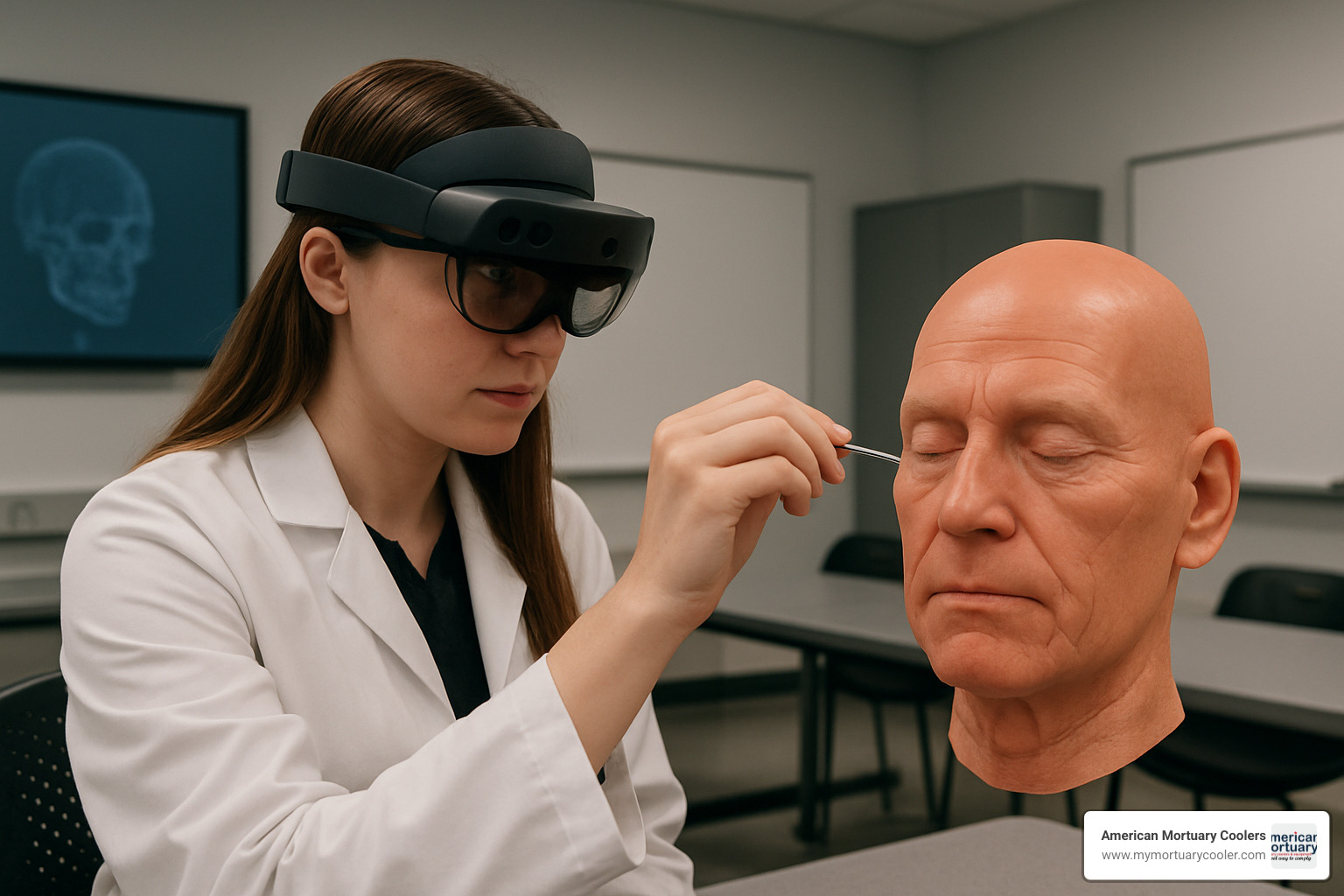
At American Mortuary Coolers, we've watched technology transform funeral home operations firsthand. Our custom mortuary coolers now integrate with digital monitoring systems that track temperature and humidity remotely. Graduates who understand these technological integrations often advance faster and command higher salaries.
Tech & Sustainability Trends Shaping mortuary science degree colleges
The funeral industry is experiencing a quiet revolution that's reshaping what students need to learn. Progressive mortuary science degree colleges are staying ahead of these changes by incorporating new technologies and practices into their curricula.
Eco-embalming techniques are becoming increasingly important as environmental concerns grow. Families are asking for formaldehyde-free embalming methods and biodegradable preparation techniques. Some programs now teach these alternative methods alongside traditional practices.
Virtual arrangement technology got a huge boost during the pandemic, but it's here to stay. Modern programs teach students how to conduct arrangement conferences via video platforms and manage virtual memorial services. These skills proved invaluable when in-person meetings weren't possible.
Case management software now handles everything from scheduling to billing in most funeral homes. Students who graduate already familiar with these systems have a significant advantage. They can contribute immediately instead of spending weeks learning on the job.
Advanced restoration methods are getting more sophisticated every year. 3D printing technology can now reconstruct damaged features with remarkable accuracy. Digital photography helps match skin tones and facial characteristics in ways that weren't possible just a few years ago.
We've seen how these technological advances affect daily operations in funeral homes across the country. Our clients regularly tell us about new equipment and methods they're implementing. Graduates who understand these integrations are better positioned for leadership roles and career advancement.
Beginners Guide to Mortuary Science covers many of these emerging trends and technologies that are reshaping the profession.
The key is choosing a program that balances traditional skills with forward-thinking preparation. You want to be ready for the funeral industry as it exists today and as it's evolving for tomorrow.
Frequently Asked Questions about Choosing a Mortuary Science Program
When we talk with prospective students, the same questions come up again and again. After years of working with funeral homes and recent graduates, I've learned these concerns are completely normal—and getting clear answers upfront can save you months of uncertainty.
What careers can my degree open up?
Here's something that surprises many people: mortuary science degree colleges prepare you for way more than just funeral directing. The skills you learn—attention to detail, compassion under pressure, and technical expertise—open doors across the death care industry.
Funeral directors handle the business side, coordinating services and supporting grieving families through difficult decisions. It's part counselor, part event planner, part business manager. Embalmers focus on the technical preservation and restoration work that requires steady hands and scientific knowledge.
But the opportunities extend far beyond traditional roles. Autopsy technicians assist pathologists in medical examinations, while anatomical donations coordinators manage body donation programs for medical schools. Some graduates become cemetery operations managers, overseeing burial grounds and memorial services.
Military families need specialized care, which is where armed forces decedent affairs specialists step in to handle military funeral protocols. Crematory operators manage the technical side of cremation, and funeral goods sales representatives help funeral homes select caskets, urns, and other supplies.
The financial outlook is solid too. The median salary across these positions hits $52,000 annually, with experienced professionals earning significantly more. Geography makes a big difference—funeral directors in metropolitan areas often earn $70,000 or more, while business ownership can push earnings well into six figures.
How long does a typical program take?
The honest answer is "it depends on what you're looking for." Certificate programs get you basic funeral directing credentials in 6-12 months, perfect if you're already working in the industry and need formal certification.
Most students choose associate degree programs, which take 18-24 months and provide comprehensive education in both technical skills and business operations. Some schools offer accelerated programs that compress this timeline to 12-18 months, though you'll want to make sure they don't sacrifice hands-on experience for speed.
Bachelor's degree programs take four years but include broader general education requirements. These programs often lead to management positions faster and may be required for certain state licensing boards.
We've seen schools advertise completing their Associate of Science program in just 18 months as "one of the shortest programs available." While speed sounds appealing, shorter isn't always better. Make sure any accelerated program still provides adequate lab time and practical experience.
Part-time options are rare because courses build on each other sequentially, and lab scheduling needs make flexible timing difficult. Most programs use cohort models where your class progresses together through required coursework.
What admission prerequisites should I expect?
Getting into mortuary science programs isn't as complicated as medical school, but there are specific requirements you'll need to meet. The academic side starts with a high school diploma or GED and usually requires a minimum GPA of 2.75 or higher.
Most programs want you to complete prerequisite courses in anatomy, physiology, and chemistry before starting. Some schools let you take these as part of your program, while others require them upfront. English composition proficiency is standard since you'll be writing reports and communicating with families.
The health and safety requirements reflect the nature of the work. You'll need a physical health examination and Hepatitis B vaccination series. Many programs now require COVID-19 vaccination, though requirements vary by clinical site. Drug screening and criminal background clearance are standard—this industry requires absolute trustworthiness.
Your application package typically includes official transcripts from all previous institutions and letters of recommendation, often from science professors if you've taken prerequisite courses. The personal statement or essay gives you a chance to explain why you're drawn to this profession.
Many programs require an interview with admissions committee and some ask you to interview with a licensed funeral director to demonstrate your understanding of the profession. This isn't meant to intimidate you—it's their way of ensuring you understand what you're signing up for.
Competitive programs may have limited enrollment, making early application essential. Some schools also look for volunteer experience in healthcare or human services, showing you're comfortable working with people during difficult times.
Conclusion
Choosing the right mortuary science degree colleges sets the foundation for your entire career in funeral service. The five strategies we've covered—verifying ABFSE accreditation, comparing program formats, scrutinizing costs, demanding hands-on experience, and confirming licensing requirements—will help you avoid costly mistakes and position yourself for long-term success.
The timing couldn't be better to enter this meaningful profession. With 9% projected job growth through 2031 and competitive salaries averaging $52,000 annually, funeral service offers both stability and purpose. The 24% surge in mortuary school enrollment during 2021 reflects growing recognition of these career opportunities.
What draws most people to this field isn't just the job security—it's the chance to help families during their most difficult moments. Every day, you'll use both technical expertise and genuine compassion to serve your community with dignity and professionalism.
At American Mortuary Coolers, we've spent years understanding how education and equipment work together in the funeral industry. From our Tennessee headquarters, we deliver custom mortuary coolers to funeral homes across the contiguous 48 states. We've seen how graduates from quality programs combine their technical skills with reliable equipment to provide exceptional family care.
Your smart college choice today creates opportunities that last throughout your career. Take time to research thoroughly, visit campuses in person, and ask the detailed questions we've outlined. Don't rush this decision—the right program will prepare you for both the technical demands and emotional responsibilities of funeral service.
When you graduate and begin your career, you'll need equipment partners who understand your commitment to excellence. Our custom mortuary coolers ensure optimal preservation conditions, supporting the professional skills you'll develop during your education. Quality equipment isn't just about functionality—it's about maintaining the dignity and respect that families deserve.
The funeral service profession needs dedicated professionals who can balance technical expertise with heartfelt compassion. The right mortuary science degree colleges will prepare you to excel in both areas, setting you up for a rewarding career that truly makes a difference.
More info about mortuary coolers and how quality equipment supports your professional success after graduation.




















